Russia-Ukraine war latest: Civilians urged to evacuate Sloviansk as bombing intensifies; Russia occupying 20% of Ukraine, says Zelenskiy – live | Ukraine
Civilians urged to evacuate Sloviansk as Russia bombing intensifies
The bombing in eastern Ukraine is becoming more intense and, with no water or electricity, 100 people or so heeded the mayor’s call on Thursday to evacuate the city of Sloviansk which sits in Russia’s crosshairs, Agence France-Presse reports.
“The situation is getting worse, the explosions are stronger and stronger and the bombs are falling more often,” 18-year-old student Goulnara Evgaripova told AFP.
Outside an administrative office, she boarded one of five minibuses earmarked to take people out of the city in the Donetsk region that Moscow wants to control.
One Russian strike killed three people, wounded six and left a trail of damage on Tuesday in Sloviansk, witnesses told AFP.
Mayor Vadim Liakh, spoke of a fresh bombardment on Thursday that damaged electricity lines on the edge of the city which boasted a population of 100,000 before the late February invasion.
“There is no electricity, the water supply is down,” Liakh posted on the Telgram messenger service.
“The best solution in this situation, is to evacuate.
“Take care of yourselves. Pack your bags,” he urged.
In 2014, when Russia grabbed the Crimean peninsula from Ukraine, Moscow-backed separatists also seized Sloviansk, before Ukrainian forces regained control.
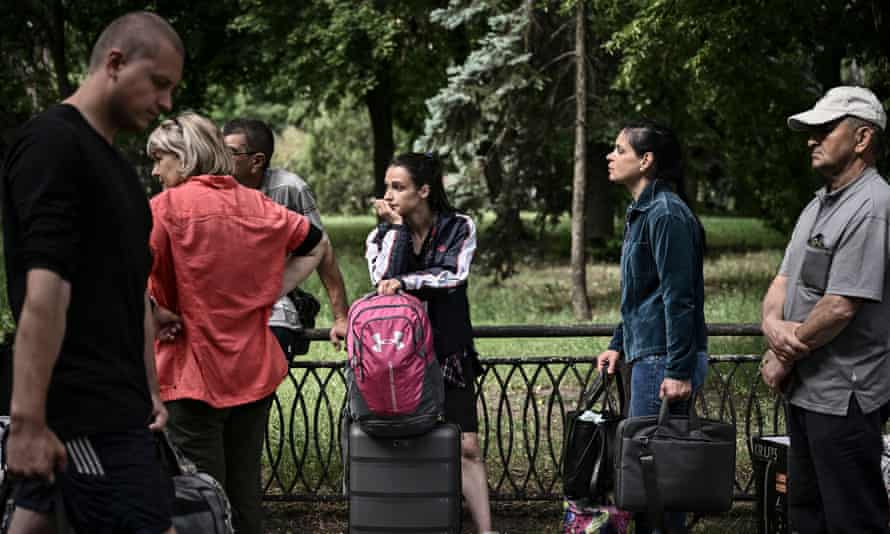
Some 60% of the infrastructure and residential buildings in Lysychansk, one of only two cities in the east still under at least partial Ukrainian control, have been destroyed from attacks, a local official said Thursday, the Associated Press reports.
Oleksandr Zaika, head of Lysychansk City Military-Civil Administration, said on an “information telemarathon” cited by the Unian news agency that non-stop shelling had knocked out electricity, natural gas, telephone and internet service.
One of the most critical pathways for supplies and evacuations, the Bakhmut-Lysychansk highway, is still open but under constant bombardment.
Humanitarian supplies are still reaching the city, where shrapnel and mines dot the landscape, he said.
Zaika said 20,000 people are left in the city, down from a pre-war population of 97,000.
Lysychansk is separated by a river from the other city in the region that’s still under at least partial Ukrainian control, Sievierodonetsk. It, too, is under Russian siege.
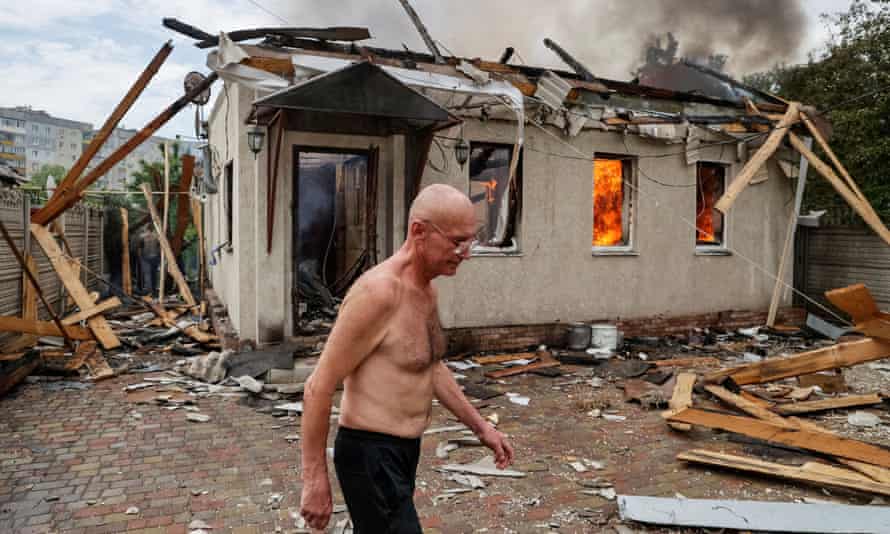
Pedestrians pass by empty yellow school busses where stuffed toys symbolizing each of the 243 killed Ukrainian children are displayed on seats during an action marking the International Children’s Day, in Lviv, Agence France-Presse reports.
Pedestrians pass by empty yellow school busses where stuffed toys symbolizing each of 243 killed Ukrainian children are displayed on seats during an action marking the International Children’s Day, in Lviv.
📸 Yuriy Dyachyshyn #AFP pic.twitter.com/0jmSeTcx4v— AFP Photo (@AFPphoto) June 2, 2022
Ukrainian forces have had some success fighting Russians in the city of Sievierodonetsk but the overall military situation in the Donbas region has not changed in the last 24 hours, Volodymyr Zelenskiy said on Thursday, Reuters reports.
In a late night video address, Ukraine’s president thanked the US president, Joe Biden, for promising to send missiles and said he expected good news about weapons supplies from other partners.
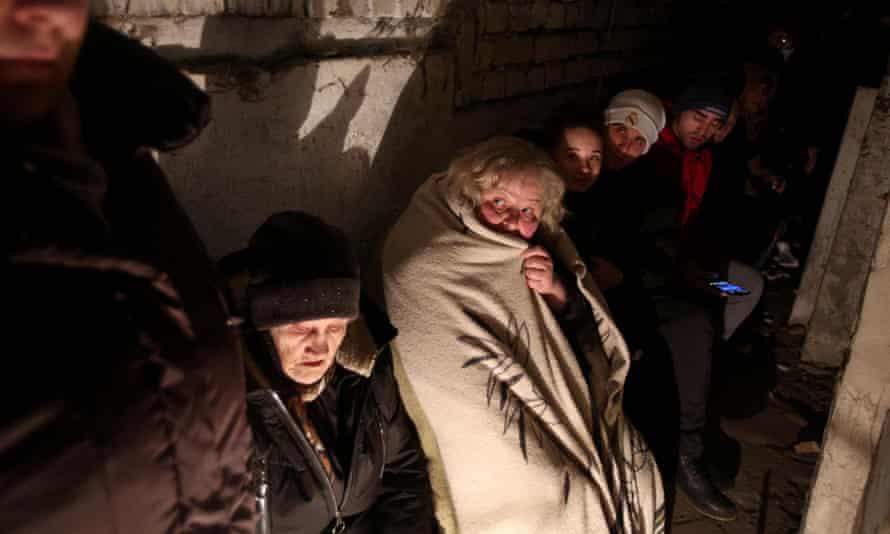
UN aid chief Martin Griffiths arrives in Moscow to discuss grain exports
UN aid chief Martin Griffiths is in Moscow on Thursday and Friday to discuss clearing the way for exports of grain and other food from Ukraine’s Black Sea ports, Reuters reports.
Griffiths will meet Russian officials days after another senior UN official, Rebecca Grynspan, had “constructive” talks in Moscow with Russia’s first deputy prime minister, Andrei Belousov, on expediting Russian grain and fertilizer exports.
The UN secretary-general, Antonio Guterres, is trying to broker what he calls a “package deal” to resume both Ukrainian food exports and Russian food and fertilizer exports, which were disrupted by Russia’s invasion of Ukraine in February.
“The situation remains fluid. The Secretary-General, and the two main people he has tasked to work on this, Rebecca Grynspan and Martin Griffiths – we will do and go anywhere we need to go to push this project forward,” UN spokesperson Stephane Dujarric said.
Russia’s defence ministry said on Thursday that vessels carrying grain can leave Ukraine’s ports in the Black Sea via “humanitarian corridors” and Russia is ready to guarantee their safety, Interfax news agency said.
Russia’s war in Ukraine has fuelled a global food crisis with prices for grains, cooking oils, fuel and fertilizer soaring. Russia and Ukraine account for nearly a third of global wheat supplies. Russia is also a fertilizer exporter and Ukraine is a major exporter of corn and sunflower oil.
Since the invasion, Ukrainian grain shipments from its Black Sea ports have stalled and more than 20m tonnes of grain are stuck in silos, while Moscow says the chilling effect of Western sanctions imposed on Russia has hurt its fertilizer and grain exports.
The US ambassador to the United Nations, Linda Thomas-Greenfield, said on Tuesday that the United States is prepared to give “comfort letters” to shipping and insurance companies to help facilitate exports of Russian grain and fertilizer.
But she also said: “Russia is able to get its oil out, and that’s sanctioned. They should be able to get their grain out that’s not sanctioned.”
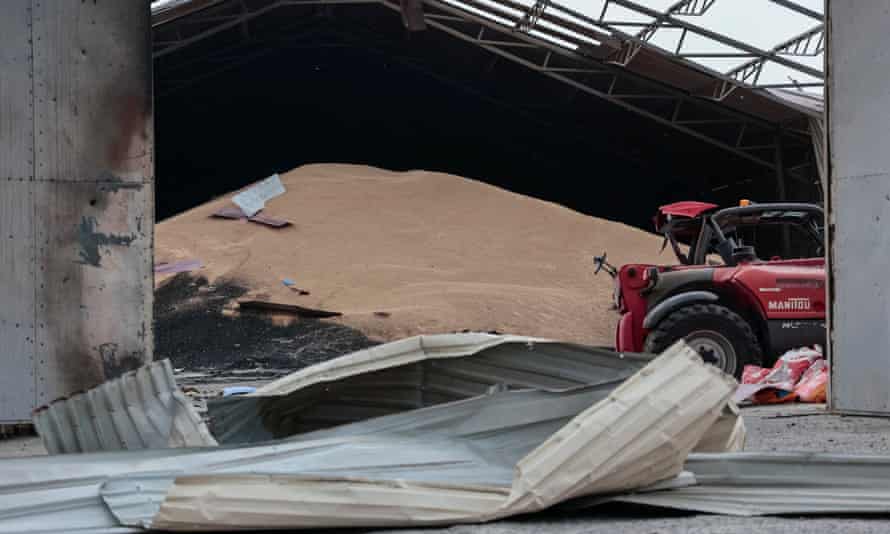
Civilians urged to evacuate Sloviansk as Russia bombing intensifies
The bombing in eastern Ukraine is becoming more intense and, with no water or electricity, 100 people or so heeded the mayor’s call on Thursday to evacuate the city of Sloviansk which sits in Russia’s crosshairs, Agence France-Presse reports.
“The situation is getting worse, the explosions are stronger and stronger and the bombs are falling more often,” 18-year-old student Goulnara Evgaripova told AFP.
Outside an administrative office, she boarded one of five minibuses earmarked to take people out of the city in the Donetsk region that Moscow wants to control.
One Russian strike killed three people, wounded six and left a trail of damage on Tuesday in Sloviansk, witnesses told AFP.
Mayor Vadim Liakh, spoke of a fresh bombardment on Thursday that damaged electricity lines on the edge of the city which boasted a population of 100,000 before the late February invasion.
“There is no electricity, the water supply is down,” Liakh posted on the Telgram messenger service.
“The best solution in this situation, is to evacuate.
“Take care of yourselves. Pack your bags,” he urged.
In 2014, when Russia grabbed the Crimean peninsula from Ukraine, Moscow-backed separatists also seized Sloviansk, before Ukrainian forces regained control.

10 Russian servicemen who looted the property of Bucha residents have been identified and reported on suspicion of violating the laws and customs of war, Euromaidan reports.
10 Russian servicemen who looted the property of Bucha residents have been identified and reported on suspicion of violating the laws and customs of war
The suspects will be declared on the international wanted list, Prosecutor General reported📷 https://t.co/5faollXwoP pic.twitter.com/hX72wMNO08
— Euromaidan Press (@EuromaidanPress) June 2, 2022
“According to the investigation, from February 24 to March 31, 2022, servicemen of the military unit of the National Guard of the Russian Federation during the occupation of Bucha looted the valuables of the local population. For the sole purpose of personal gain, the Russian military confiscated private property of citizens that could not be used for military purposes: from underwear and clothing to large household appliances,” the office of Ukraine’s Prosecutor General said in a statement on Thursday.
“Pre-trial investigation in criminal proceedings is carried out by investigators of…the National Police of Ukraine,” the statement added.
European Parliament bans Russian lobbyists from premises
The European Parliament announced on Thursday that it has banned all Russian lobbyists from its premises to prevent them spreading Moscow “propaganda” about Russia’s war in Ukraine, Agence France-Presse reports.
“Effective immediately, Russian company representatives are no longer allowed to enter European Parliament premises,” the European Parliament president Roberta Metsola said on Twitter.
Effective immediately, Russian company representatives are no longer allowed to enter @Europarl_EN premises.
We must not allow them any space to spread their propaganda & false, toxic narratives about the invasion of #Ukraine.
We will remain united & strong against autocrats.
— Roberta Metsola (@EP_President) June 2, 2022
Metsola urged all other EU institutions, including the European Commission and the European Council, to follow suit.
A parliament spokesman said the ban was a response to “Russia creating and spreading false narratives about the war in Ukraine through multiple channels, including through state-owned companies”.
The prohibition applies to Russian companies listed as employing lobbyists to the EU as well as those on the bloc’s sanction blacklist.
The parliament in 2015 had already banned Russian diplomats from its premises, which include chambers and annexes in Brussels and the French city of Strasbourg, in response to Moscow banning several EU politicians vociferous over its annexation of Crimea.
German MEP Erik Marquardt, of the Greens, welcomed the ban saying that “especially oil and gas lobbyists” working on behalf of Russian companies had been trying to “spread propaganda and disinformation” in recent months.
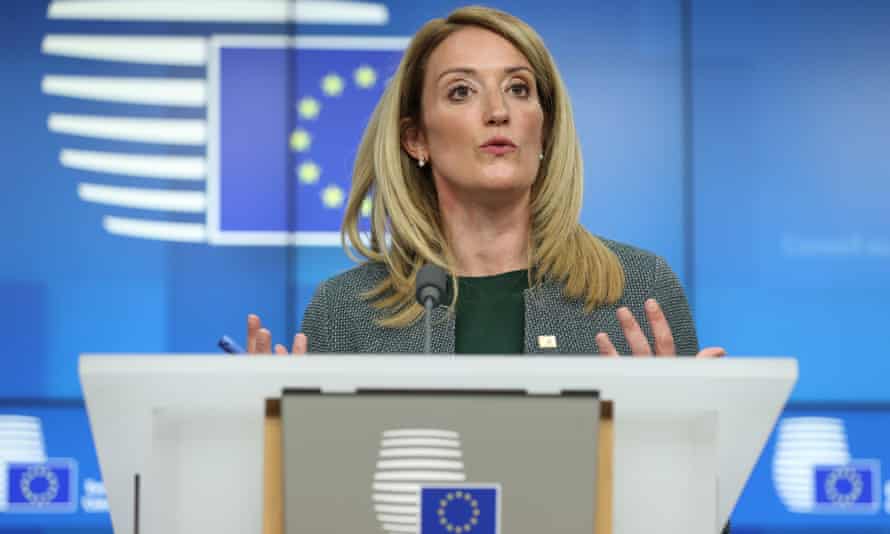
Ukraine’s state-run nuclear power operator, Energoatom, on Thursday denied it might shut down a major atomic power plant that lies in Russian-occupied territory if Kyiv loses control of operations at the site, Reuters reports.
The Zaporizhzhia facility in southeast Ukraine is Europe’s largest nuclear power plant. Russian troops have taken over the plant, but Ukrainian specialists are still running it.
Russian news agency Interfax cited a Ukrainian presidential aide as saying the plant could be shut down if Kyiv lost all control.
But in a statement, Energoatom said the plant “cannot be turned off from a technical, security, economic or political point of view.”
Ukraine’s state-owned grid operator last week dismissed as “physically impossible” the suggestion by a Russian official that the plant would supply Russia with electricity.
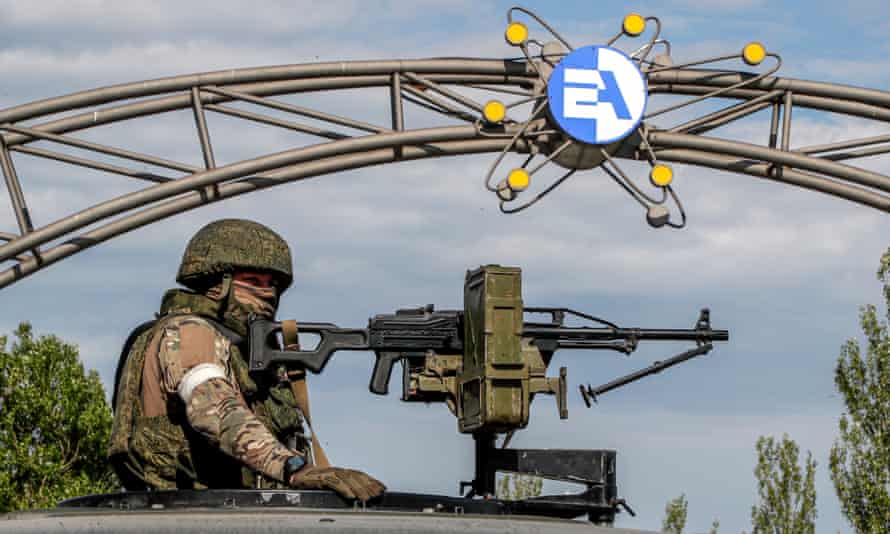
Summary
It’s 9pm in Kyiv. Here’s where we stand:
- Ukraine more than doubled interest rates to 25% on Thursday in a move to try to stem double-digit inflation and protect its currency, which has collapsed since Russia’s invasion. In the first interest rates intervention since Vladimir Putin’s troops attacked on 24 February, the Ukrainian central bank’s governor, Kyrylo Shevchenko, increased the benchmark interest rate from 10% to 25%.
- Nato’s secretary general, Jens Stoltenberg, said the alliance was in touch with Turkey to find a “united way” forward to address Ankara’s concerns over Sweden and Finland’s bid to join the pact. Stoltenberg’s latest remarks come after he told reporters yesterday that he would convene senior officials from Finland, Sweden and Turkey in Brussels in the coming days to discuss the issue.
- Russian forces are currently occupying about 20% of Ukraine’s territory, Volodymyr Zelenskiy said in a video address to the Luxembourg parliament. The front lines of battle stretch across more than 1,000km (620 miles), the Ukrainian president said, adding that 100 Ukrainians are dying on a daily basis in eastern Ukraine, and another 450-500 people are wounded.
That’s it from me, Léonie Chao-Fong, today. I’ll be back tomorrow. My colleague, Maya Yang, will be here shortly to bring you the latest developments from the war in Ukraine.
Pro-Russian officials in the occupied Zaporizhzhia region of Ukraine said a decree has been issued to “nationalise” state assets in the southeastern region.
The decree has been signed by officials installed by Moscow and applies to strategic firms, land and natural resources, the RIA news agency quoted the administration as saying.
The “liberated” region of Zaporizhzhia will “nationalise” the state property of Ukraine, a member of the region’s pro-Moscow military-civilian administration, Vladimir Rogov, wrote on Telegram.
The deputy head of the Moscow-imposed administration, Andrei Trofimov, said the nationalisation would affect land, natural resources, facilities in strategic sectors of the economy, as well as property owned by Ukraine as of 24 February – the day when Russia invaded.
Trofimov said:
The decree was signed in order to meet state needs related to improving the overall efficiency and social orientation of the economy, as well as to preserve the national heritage for residents of the Zaporizhzhia Region.
Russia claimed full control of the Kherson region in March and holds parts of the Zaporizhzhia region to the northeast.
In May, Putin signed a decree simplifying the procedure for residents of the regions of Zaporizhzhia and Kherson to apply for Russian citizenship.




